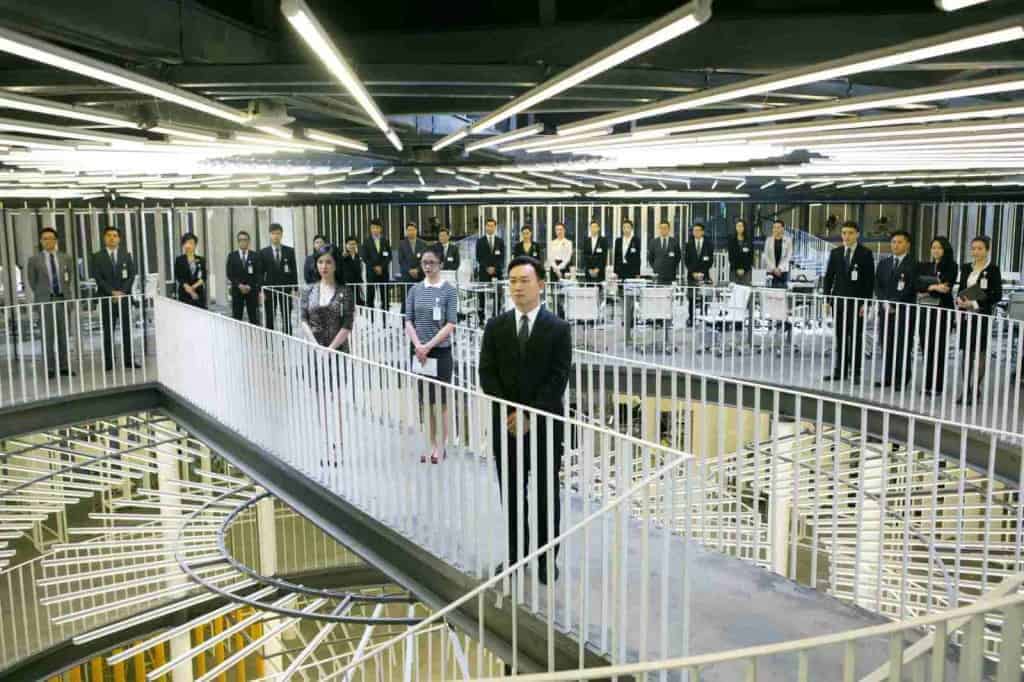Johnnie To borrows from the conventions of theatre, especially in his set design, to craft a satirical corporate musical.

In Johnnie To’s new corporate musical, Office, Sylvia Chang (who wrote the screenplay) plays a no-nonsense top-level business executive, CEO Miss Chang. Dressed in blazers with sharp lines and sometimes pointy shoulders, or a bold, black sweater with striking sequins, the power suit is her armour she wears into battle.
She is not-so-secretly the mistress of the company’s owner Chairman Ho Chung-ping (Chow Yun-Fat), who started as her mentor and boss and whose wife is lying in a coma. Chairman Ho is about to take the company public, amidst the Lehmann Brothers collapse, and he’s promised Chang riches and more. Although Chang hopes to usurp Chaiman Ho’s wife in his heart, she’s also far too set on usurping Chairman Ho in his company, which will be her undoing.
When the film opens, two new hires are learning the ropes in the company: Xiang Li (Wang Ziyi), a naive and idealistic new assistant, and the mysteriously over-educated Kat (Lang Yueting) with a penchant for designer clothing that someone of her stature shouldn’t be able to afford. When Xiang Li finds himself in the executive elevator, alone, with Chang, she decides to kickstart his career, moulding him into the image of her business partner David (Eason Chan). Meanwhile, Kat’s father, Chairman Ho, is grooming her to takeover by sending her on this undercover mission to learn the ropes at the company before anyone knows who she really is.
Amidst all of this corporate intrigue is a biting satire about the brutality of business, the unpredictable whims of the executive that dictate the lives of their underlings, and whether striving to rise up the ranks — and up the staircase of the office to the executive suites — through mind-numbing hard work is really worth it, after all. Along the way, there’s romance, songs, and some amusing jabs at capitalism.
To tells so much of the film’s story through his sets, the character’s costumes, and how he uses space. The way Chairman Ho casually fits into a well-tailored suit, like it’s the most natural thing in the world, is indicative of his position of power, and boy does Chow Yun-Fat wear it well. Kat shares her father’s privilege, but she wears sensible clothing with softer lines, a less scary future head honcho than Chang, though every bit as intelligent. In one amusing scene, Change spots Kat wearing the same designer shoes as her, only Kat’s are flats for she needn’t try as hard.
The film’s sets seem designed for a stage musical: almost everything takes place in the two-storey space where the office is, though spaces get reused with new furniture wheeled in and out. There are no hard walls, just pillars here and there to indicate the outline of a wall, allowing us to see through the entire set. Even the subway doesn’t have doors or a ceiling, just outlines of such things, so To can look in at the space from afar. A large clock, straight out of 9 to 5, takes its place centre stage, the grinding of its hands a persistent reminder of how work rules everything in these characters’ lives: it’s present even as we visit characters at home or Ho’s wife in the hospital.
To’s camera is always moving, sometimes dizzyingly to its detriment, but it does often mimic how your eyes would move when watching a play: from character to character, from one level of the set to the next, and from left to right. Most of the film’s choreography is in the movement of the camera — there’s singing but no dancing — which sometimes seems like a cop-out. Yet there is so much artistry in the arrangements of the actors, if not always in how they move, that this is clearly the work of a master of blocking and a devotee of the theatre. Because the office is a place of performance, this theatre-like set helps to drive the film’s meta-narrative.
The film drags a little toward the end, especially as we stray far enough from the office that CGI effects get used, creating unnecessary artificiality. But as the threads come together and the company’s dynasties establish themselves, the film is provocative in its exaggeration — it may be funny but it’s a bit too real — and always, always visually dazzling. If you think that theatre has nothing to do with your cinephilic tendencies, Office is easy proof that the masters of cinema tend to borrow from the stage, to often exquisite effect.

